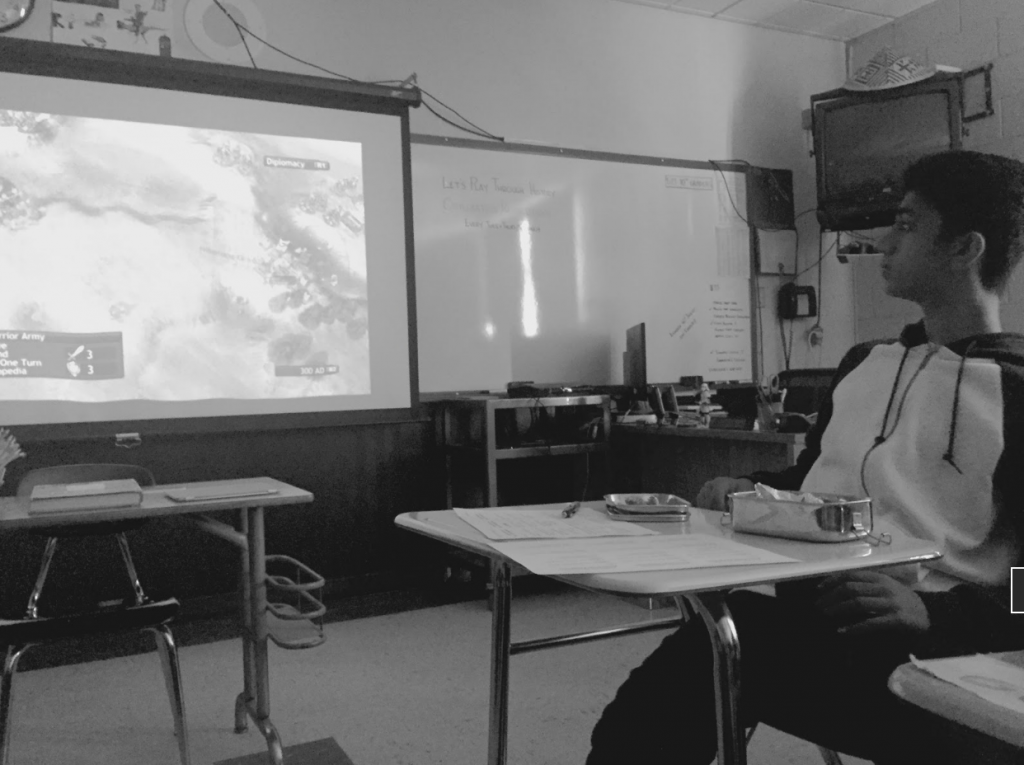Playing Through History combines history with video games
Prateek Ashthana (10) watches as his classmate plays “Civilization Revolution” on PlayStation 3
December 2, 2016
Under the supervision of Honors World History teacher Mr. V, a group of sophomores devise a battle plan.
“Guys, do you want to attack the new city or the first city?”
“Look at Barcelona. Take the new city.”
“Yeah, just keep going—”
“Yeah, move that one there. Just defend—”
Playing Through History is a new part of Mr. V’s class, serving as an extra credit opportunity for his students. Students who show up to at least two out of the three sessions each week to play a selected video game are able to complete an extra credit assignment connecting the video game to the events they’ve discussed in class.
“This is a combination of my two favorite things, which is videogames and history,” Mr. V said. “So it felt like a natural thing. It was a thing I was passionate about, and I felt that this would be a way to connect with my students.”
The students will play a different game for each unit. For their first unit on French Revolution, they played “Assassin’s Creed Unity,” which follows the centuries-old struggle between different forces in Paris. For their World War I unit, they’ll play “Battlefield 1,” taking on the roles of Italian storm troops attempting to seize an Astro-Hungarian fortress, Bedouin rebels working with British intelligence, and more.
For the World War II unit, they’ll play a combination of Call of Duty and a flight simulator game about Pearl Harbor. During the Cold War unit, they’ll play a few indie games, including “Papers, Please,” which focuses on the work of an immigrations officer at border checkpoints for the fictitious country Arstotzka in 1982, and ICBM, which provides a realistic experience of being a deputy missile combat crew commander.
“It hasn’t translated to quantifiable improvement, but there are some students who would normally maybe not do so well who are more interested and engaged. It kind of creates a positive atmosphere and I’m seeing the difference.” Mr. V said. “I also noticed that kids did a really good job of calling stuff out like while we were playing a game, like identifying Baroque art on the walls, or saying, ‘That’s not what happens!’
Research has shown that playing video games can help stimulate academic literacy and successful learning strategies. For example, researchers at the Massachusetts Institute of Technology have launched Education Arcade, computer games meant to promote authentic and engaging play.
“Games … open up a space for people to explore, strategize, and learn,” writes Jesse Sell, a research assistant in the Education Arcade. “They offer new perspectives on old subjects and allow players to break into difficult subjects with ease.”
This is a point that Mr. V wanted to emphasize.
“A lot of adults, especially a lot of adult teachers, have this mindset that videogames are a distraction to work, that they are a negative influence, or a waste of time,” he said. “And I think that’s erroneous on a lot of levels. Video games are a great way to approach content, particularly history content, in a way that’s fun and unexpected. They’re a tool, and if you use them well, they can benefit your teaching, not distract from it. It’s much more interesting than just looking through your textbook and reading about dead people.”










